
There were 398 passengers on that plane.
Twenty died.
Over 120 were injured.
Fortunately, most of them survived.
The reason was quick thinking on part of a soon-to-be 23-year-old Pan Am attendant Neerja Bhanot on flight 73, the aircraft that was hijacked in Karachi on 5 September, 1986.
Owing to the upcoming biopic, Neerja, on Bhanot's short but heroic life, where Sonam Kapoor will essay the titular character, many details of the horrifying 16-hour siege have been revisited. However, none of those details explain why Pakistan would want to ban this film from their theatres.
What's even more baffling is that it has been banned without being submitted to the censor boards. The ministry of commerce in Pakistan had initially authorised the import of the film, but later changed their decision. It has further instructed the Pakistan Electronic Media Regulation Authority (PEMRA) to not air Neerja on cable channels throughout the country, PTI reports.
"The ministry issued us a No Objection Certificate (NOC) to import the film and bring it to Pakistani territory but later revoked it," an official with IMGC Entertainment says.
While it appears to be an arbitrary decision, IMGC Executive Director Abid Rasheed has admitted that there were 'certain anti-Pakistan elements' and that 'it showed Muslims in negative light'.
"This might not have gone down well with local audiences," he says.
And the irony kicks in.
If newspaper clippings from September 1986 and later are to be believed, Neerja Bhanot did not save lives based on nationalities. She hid passports and even disposed off some just to maintain passenger confidentiality.
As the Pan Am Flight 73 was flying from Mumbai (then Bombay), via Frankfurt, to New York, the airplane had people of many nationalities. Including Pakistanis.
Accounts from Pakistan nationals who survived
1. The Salt Lake Tribune, 2011
Article author Jeremiah Stettler tells the story of Majid, a Pak national who was on the flight.
"Flight attendants hiding American passports as terrorists take control of the plane. Hijackers uttering Muslim prayers, the same ones Majid prayed as a child, before turning their rifles on men, women and children. Passengers scrambling through seats to get to an exit door. Him running across the tarmac on a broken foot, without shoes, after an excruciating drop from the wing. A little girl in his arms as he lifted her, despite his own desperation, over a wall separating the airstrip from safety.
'"I was not sure whether I would survive or not," Majid said."
2. The Star, 1991
Mohammad Aziz Haji Dossa writes a personal account about his friend's brother Hussain (from Pakistan) being rescued by Bhanot, who died herself soon after.
"Hussain had come on a 3 weeks' vacation in Karachi during Id-ul-Azha holidays and was returning to New York. He was the first passenger to enter the plane, when he was courteously wished "Good Morning, Sir" by the auburn haired girl. In the Pan Am uniform of white blouse and dark skirt, Hussain would fondly recollect, the air-hostess was a facsimile of a celebrated Indian actress. He would identify her as Neerja and contend that the broad smile, to keep the passengers cheerful and happy, never left her face, through the unending, seventeen, tribulating hours.
"With the hijacking of the plane, Hussain and the passengers were forced to sit on the carpeted floor. The undaunted Neerja continuously remained on her feet serving coffee, sandwiches and provided for every need of the entrapped passengers that was conceivable under the circumstances; at the same time, she would whisper comforting words in their ears.
"Husain related that as the lights went out at in the night, he was herded with the passengers and as the shooting started, from nowhere his saviour Neerja had the presence and the nerve, to steal through the pandemonium of the screaming injured and the dying men, women and children to make a dash for the emergency door. Though fragile, Neerja, by sheer zest, it seems, single-handedly opened the chute. Hussain reminisced the farewell words of Neerja, to him and other passengers of "Get Out. Run" would forever ring in his ears."
Fact check
While yes, there were accusations about Karachi airport having failed to conduct the correct security procedures and unwittingly letting terrorists through, Pakistan is clearly not the villain here. If the film fails on this account, it should be a matter openly raised, and not covertly banned.
The hijackers were led by Zayd Hassan Safarini who headed the four-member group of the Abu Nidal Organisation, a radical Palestinian splinter group. The four had disguised themselves as Pakistani security guards and managed to board the plane. Their intention was to force the crew to fly the plane over Israel, where they would have blown it up.
Neerja Bhanot, by alerting the crew inside the cockpit and ensuring their timely escape, successfully grounded the plane, thereby foiling all plans made by the hijackers.
Remembered, even in Pakistan
While there is no clear number on just how many Pakistani lives Bhanot saved that day, given the evidence of her professional conduct, it does seem rather off putting that Pakistan doesn't want her citizens to witness her life on screen. Especially as this is the same country that awarded her the most sensitive honour posthumously.
While India showed her reverence to Bhanot by awarding her the Ashok Chakra (the youngest recipient ever) and the USA, a country whose citizens she guarded with her life, gave her a Flight Safety Foundation Heroism Award, Pakistan chose to celebrate Neerja Bhanot's memory with the Tamgha-e-Insaniyat, an award given for showing incredible human kindness.
Why is Pakistan forgetting the brave young woman's insaniyat now, 30 long years later?



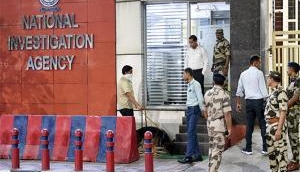
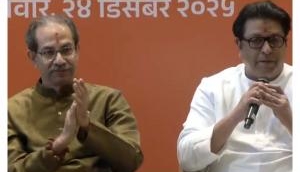
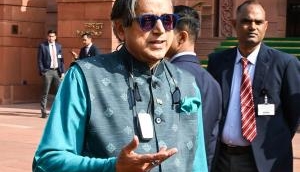
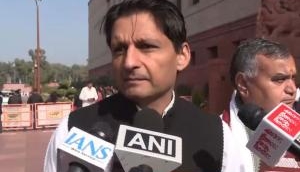
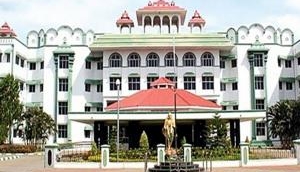
![BJP's Kapil Mishra recreates Shankar Mahadevan’s ‘Breathless’ song to highlight Delhi pollution [WATCH] BJP's Kapil Mishra recreates Shankar Mahadevan’s ‘Breathless’ song to highlight Delhi pollution [WATCH]](https://images.catchnews.com/upload/2022/11/03/kapil-mishra_240884_300x172.png)

![Anupam Kher shares pictures of his toned body on 67th birthday [MUST SEE] Anupam Kher shares pictures of his toned body on 67th birthday [MUST SEE]](https://images.catchnews.com/upload/2022/03/07/Anupam_kher_231145_300x172.jpg)






